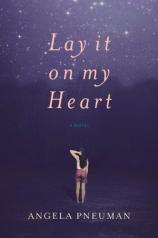Excerpt
Excerpt
Lay It on My Heart

Chapter 1
My mother and I get along better with a room or two between us. The way she’s humming now, to herself, is the kind of thing that would make me crazy up close. But there’s something separate and free about the fact that she doesn’t know I’m listening, like she’d be doing this same thing if I didn’t exist, or if I was someone else’s daughter she knew only from church or the IGA. She breaks into a soft, nervous soprano. “My Favorite Things.” The words lilt over the opening and closing of her dresser drawers, over the sound of Mayor James’s lawnmower next door approaching and retreating like something that can’t make up its mind.
It’s August, hot, and I’m waiting in the foyer on the bottommost stair, trying to catch the breeze from the window.
“Charmaine?” my mother calls now from the bedroom, breaking off the song. She likes to exaggerate the French pronunciation of my name, for fun, in a way that pains me: Shah-hah-mehnn. “Come help me dress,” she says. “I have something to share with you.”
In the bedroom I find her pulling her beige half-slip over her head, letter from my father in one hand. The international mail was so slow that it didn’t arrive until just this afternoon, as we’re about to head out to collect him from the Bluegrass Airport.
“We’re not French,” I say.
“We’re a little bit French,” she says, speaking through the thin polyester fabric. “Maybe.”
She shrugs the slip down past her shoulders and bra, settles the elastic at her waist, and flaps the letter at the bed, where our black cat, Titus, sniffs at the airmail envelope. “Your father’s had new revelation,” she says.
I perch on the bed and study the Jerusalem postmark. God’s own city.Where my father, a man after God’s own heart, a prophet, has spent the past month. Prophecy is the rarest of spiritual gifts. Usually it involves God telling my father what kinds of things to bring to people’s attention, but sometimes it involves God telling him what to do. Like visit the Holy Land. Or before that, take a year’s leave from The Good Word Press, where he writes up his prophecy, so that we can live, as we’ve been doing since last summer, on faith alone.
“What kind of revelation?” I say carefully.
My mother is frowning into the grainy mirror over the dresser, eyeing the tiny roll of loose skin that spills over the waistband of her slip.
“Phoebe,” I say. “A revelation like to live on faith alone?”
“Let’s hope not,” she says. “Charmaine. I think we’re done living on faith alone. It’s exhausting. Look here. Never forget to draw in the muscles, see? See?” She waves her arms until I look, then sucks in her stomach, pointing at the way the loose skin disappears. “Then you’ll never need a girdle. A project, he calls it, which sounds practical. If I had to guess, I’d say your father’s starting a new series of articles. About our year, maybe, or his trip. Maybe he’ll even write a book.” She steps into the bottom half of a cornflower blue suit she sewed herself. Bespoke is what she calls it, if anyone asks.
Inside the airmail envelope is a postcard made out to me. It shows a tall, thin boulder rising from a faded landscape of rock, standing craggy and pale against blue, blue sky above an even deeper blue sea below. The Dead Sea. Which is really a lake, my father explains on the back, underneath which, quite possibly, lie the ruined, sinful cities of Sodom and Gomorrah. The boulder is supposed to be Lot’s disobedient, unfortunate wife. That’s all the note says. I flip the card back over and study the picture, wishing I could tell if this particular choice has anything to do with his revelation. Lot’s wife. One way you can look at the boulder makes her seem stuck in mid-motion, like she’s trying to move forward and turn back all at the same time. The other way makes her look like she’s hunched into herself, maybe under a shawl, watching her home disappear under a merciless rain of fire.
Phoebe adjusts the skirt and squares her shoulders. She studies me with a serious, confiding tilt to her head, which usually means she’s about to share something she’ll want to stay just between us. Like her secret tailoring jobs that have kept us in peanut butter for the past year, which my father never thinks to question. Or how she has it on good authority that my grandmother, Daze, thinks my father married down. Since my father’s been away, I’m beginning to wonder if all information can be sorted into what I wish I knew and what I wish I didn’t.
“Listen,” Phoebe begins, but I don’t want to. I scoop up Titus and jiggle him in Phoebe’s direction until he relaxes into my arms and starts to purr.
“I’m a fat black kitty,” I say from behind his soft head.
Phoebe sighs and pinches the pads of Titus’s foot. “Look at these little black beans,” she says in her half-scornful, half-babyish cat-talking voice. By the time I let him down and stand up, she’s already on to something else, giving me the once-over. “What’s that you’re wearing?”
It’s a brown dress, one that Daze bought me.
“Where’s the pretty white one I made for summer?” Phoebe says, pouting.
I shrug. I’m not about to tell her how tight it’s gotten in the chest, how the roomier brown one does a better job hiding the burdensome evidence of my first period, too — the awful belt, the safety pins, the cotton pad thick as my forearm. In 1989 you can’t even buy pads for a belt anymore, but Phoebe found a year’s supply at a closeout sale. Fifty cents a box. And if I reminded her of any of this now, I’d have to hear the words your breasts again, and your flow, whispered at me in her best private voice.
Outside, the sky is a low, humid ceiling. Everything under it is muddled with heat. We head north out of town, past the campus of the East Winder Seminary, past the retirement home named after my grandfather, the famous evangelist Custer Peake. Daze, his widow, lives there now. We pass the tree streets — Elm, Maple, Walnut — that dead-end at the seminary’s neglected athletic field. On a hill in that field stands our huge water tower with the light-up electric cross on top. Underneath that tower, before I was born, Custer Peake led more than four hundred people to the Lord in one of the world’s largest spontaneous revivals. It went on for two weeks. People stood or sat or camped, even, listening to my grandfather over the PA system someone rigged up on day three. They came from all over, even from other states, once the word got out. It made the papers. It made the television news in Lexington and Louisville, both. On day six, my father came home from college in Ohio to see what all the fuss was about, and on day ten, as the sun set, my grandfather sent him to meet a delivery truck from Clay’s Corner carrying two hundred loaves of Wonder Bread for communion. That’s when my father spotted her. A petite girl, standing at the edge of the crowd wearing a sun hat and cutoff dungaree shorts and the kind of halter top frowned upon in East Winder. She raised an eyebrow at him like she was waiting for something, like he’d already spoken to her and she hadn’t quite caught it all. Right then and there, before he even knew her name, the Lord laid Phoebe on my father’s heart as the woman he was supposed to marry.
Lay It on My Heart
- Genres: Fiction
- paperback: 288 pages
- Publisher: Mariner Books
- ISBN-10: 015101258X
- ISBN-13: 9780151012589




